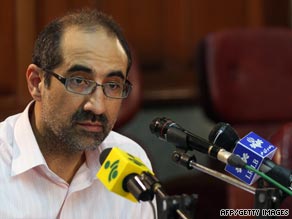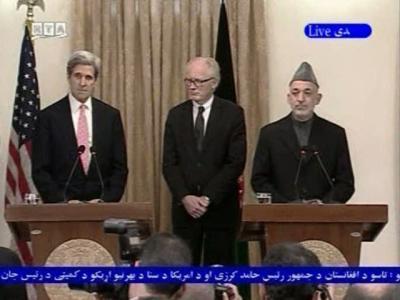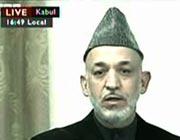Over the past century, the U.S relationship with Iran has been volatile, and the coming months may prove to be a decisive era in the history of the relationship between the two countries. A misreading of the situation in Iran might lead to decisions which will damage the national interests of both countries.
The harsh repression of peaceful protests in the wake of the disputed Iranian election this past June removed any doubt about the cruelty of the Iranian totalitarian regime. Direct shots fired at unarmed civilians in Iran captured global attention, but this was only an example of the atrocities that were committed. Intensifying pressure on protesters, the use of Stalinist methods against detainees, and threatening university students and faculty are only few more examples of the continuing campaign against peaceful opposition in the weeks since the election.
Recent news indicates the US administration’s intention to negotiate with the Iranian government. While maintaining an active venue of negotiation is necessary for resolving the conflict between the two countries, a constructive dialogue with Iran must address the Iranian regime’s recent brutalities. Neglecting such atrocities by any country, particularly in this crucial period, would have a severe negative effect on the Iranian public. As people with deep connections to their Iranian homeland, and who have studied and worked at universities across the world, the signers of this letter are concerned about the neglect of human rights violations in Iran by the rest of the world. As the current regime faces an internal crisis of legitimacy, it is obvious that the goal of the Iranian government is not the resolution of its international conflicts. Rather, they seek a false victory for their confrontational policies, which could be used as justification for escalating the violent crackdown against domestic political opposition.
From our point of view, the confrontational policies of the previous US administration, coupled with the use of double standard in dealing with issues of human rights, have had a negative impact on the public perception of the United States' intentions in the Middle East. While we oppose any military threat against Iran, we remind American policy makers that turning a blind eye to human rights abuses, which began in 1953 with the coup against Mohammed Mosaddeq, has created suspicion within Iran about American intentions. In our opinion, neglecting the recent atrocities in future negotiations with Iran would confirm this suspicion in the eyes of the Iranian people and would have a negative effect on long-term relations between the two countries. We believe the issues of human rights violations and the Iranian government's atrocities against its own citizens are critical issues that should not be sacrificed for short term gains. It is important to remember that the Iranian public is carefully following the interactions of foreign governments with those who violated their civil rights.
1. Amir Aavani, PhD student, Simon Fraser University, Canada, Computer Science
2. Arash Abazari, PhD student, Johns Hopkins University, Philosophy
3. Ali Afshari, PhD student, George Washington University, System Engineering
4. Mazda Ahmadi, PhD student, University of Texas at Austin, Computer Science, Championship of RoboCup Rescue Championship 2002 and 2003, Runner up position 2001
5. Hamid Akbari, PhD student and Part time Faculty, York University, Canada, Strategic Management
6. Kazem Alamdari, Adjunct Professor, California State University, Northridge, PhD Sociology
7. Parviz Alivand, PhD student, University of Texas at Austin, Economics
8. Khosrow Allaf-Akbari, PhD student, University of Maryland and Princeton University, Energy Policy Studies - Astronomy, Gold Medal of Iran's Collegiate Physics Olympics 2002
9. Hamed Amini, PhD student, Ecole Normale Superieure, France, Applied Mathematics
10. Kiarash Amiri, PhD student at Rice University, Electrical Engineering
11. Amin Arbabian, PhD student, UC Berkeley, Electrical Engineering
12. Soroush Aslani, PhD student, Kellogg School of Management, Northwestern University, Organizational Behavior
13. Mitra Azizian, PhD student, Colorado School of Mines, Petroleum Engineering
14. Roja Bandari, PhD student at UCLA, Electrical Engineering, National Science Foundation Graduate Fellow
15. Anahita Basirat, PhD student, Gipsa-lab, Grenoble INP, France, Cognitive Science
16. Arash Behboodi, PHD student, SUPELEC, France, Telecommunication
17. Ahmad Beirami, PhD candidate, Electrical and Computer Engineering, Georgia Institute of Technology
18. Mostafa Beshkar, Research Associate at Yale University and Assistant Professor at University of New Hampshire, PhD Economics
19. Goodarz Danaei, Graduate student, Population and International Health
20. Ehsan Ebrahimy, PhD student, University of Chicago, Economics, Gold Medal National Math Olympiad 1996
21. Vahid Entezari, Postdoctoral Research Fellow at Center for Advanced Orthopedic Studies, Harvard Medical School, MD
22. Behdad Esfahbod, MBA student, University of Toronto, Software Engineer, Red Hat, Computer Science and MBA, Silver Medal International Informatics Olympiad 1999, Gold Medal International Informatics Olympiad 2000
23. Mehran Eslaminia, PhD student, North Carolina State University, Civil Engineering
24. Sanli Faez, PhD student at University of Twente, Netherlands, Physics, Gold Medal National Physics Olympiad 1996
25. Hassan Faghani, PhD Student, Washington University in St. Louis, Economics
26. Azadeh Farahzadi, Postdoctoral Scientist, PhD Physics
27. Babak Farzad, Assistant Professor, Brock University Canada, PhD Computer Science, Bronze Medal International Informatics Olympiad 1995
28. Maryam Farboodi, PhD student, University of Chicago, Economics
29. Roozbeh Foroozan, PhD student at Pennsylvania State University, Energy and Environmental Engineering
30. Reza Ganjdanesh, PhD student, University of Texas at Austin, Petroleum Engineering
31. Ali Ghodsi, Assistant Professor, University of Waterloo, PhD Computer Science
32. Mohammadreza Ghodsi, PhD student, University of Maryland, Computer Science, RoboCup World Campion 2005
33. Reza Golestani, PhD student, University Medical Center Groningen, Netherland, Nuclear Medicine
34. Ali Gordjinejad, PhD student, Forschungszentrum Jülich, Physics
35. Ahmad Reza Hadaegh, Associate Professor, California State University San Marcos, PhD Computer Science
36. Amir Haji-Akbari, PhD Student, University of Michigan, Chemical Engineering
37. Babak Heydari, Post Doctoral Fellow at UCLA, PhD Electrical Engineering, Gold medal National Chemistry Olympiad 1996
38. Fereydoun Hormozdiari, PhD student, Simon Fraser University, Canada, Computer Science
39. Sara Jabbari-Farouji, Postdoctoral Researcher, University of Paris Sud (Orsay), France, PhD Physics
40. Arsalan Kahnemuyipour, Assistant PRofessor, Syracuse University, PhD Linguistics
41. Kianoosh Kalantar, Graduate Student, University of Rochester, Accountancy
42. Ali Karbasi, PhD student, Florida International University, Material Science and Engineering
43. Shabnam Kavousian, Instructor, Langara College, PhD Mathematics Education
44. Moslem Kazemi, PhD student, Simon Fraser University, Canada, Engineering Science, Member of Sharif's Robocup Team, World Champion of Robocup 1999, 2000, 2001
45. Yaser Kerachian, Technology Transfer Officer, Wilfrid Laurier University, PhD Physics, Gold medal International Physics Olympiad 1995
46. Banafsheh Madaninejad, PhD student, University of Texas at Austin, Islamic Studies/Comparative Literature
47. Mohammad Mahdian, Senior Research Scientist at Yahoo Research, PhD Mathematics, Gold medal in the International Math Olympiad 1993 and two Silver medals in the International Informatics Olympiads 1992 and 1993
48. Mahdi Majbouri, PhD student at USC, Economics
49. Mostafa Majidpour, PhD student, UCLA, Electrical Engineering
50. Mehrdad Majzoobi, PhD Student. Rice University, , Electrical and Computer Engineering
51. Peyman Malaz, Graduate student at UCLA, International Relation
52. Mehrdad Mashayekhi, Adjunct Professor, Georgetown University, PhD Sociology
53. Hamidreza Mehdizadeh, PhD student at Illinois Institute of Technology, Chemical Engineering
54. Bahar Mehmani, PhD student, Institute for Theoretical Physics, University of Amsterdam, Netherlands, Theoretical Physics
55. Nargess Memarsadeghi, Computer Scientist, PhD Computer Science
56. Mohammad Mesgarpour, PhD student, University of Southampton, UK, Operational Research
57. Mazyar Mirrahimi, Researcher, INRIA The French Institute for Research in Computer Science and Control, PhD Applied Mathematics, Silver Medal International Math Olympiad 1999 - Gold Medal National Collegiate Math Competition 2000
58. Babak Mohit, Dr.PhD student, Bloomberg School of Public Health, Johns Hopkins University, Health Policy and Management
59. Anahita Mirtabatabaei, PhD student, University of California Santa Barbara, Mechanical Engineering Science
60. Kamran Moinzadeh, Professor, University of Washington, PhD Industrial Engineering
61. Nazgol Moshtaghi, PhD student of Marketing and Instructor, University of South Florida, Marketing
62. Leila Mouri, PhD student, Columbia University, Middle East and Asian Language and Culture
63. Farzaneh Najafi, PhD student, University of Pennsylvania, Neuroscience
64. Hossein Namazi, Assistant Professor, University of Texas at Austin, PhD Mathematics, Gold Medal National Math Olympiad 1994
65. Hamid Naseri, Adjunct Faculty, University of Houston, PhD Electrical Engineering
66. Amir Nayyeri, PhD student, University of Illinois Urbana-Champaign, Computer Science
67. Borghan Nezami Narajabad, Assistant Professor at Rice University, PhD in Economics, Gold Medal National Math Olympiad 1996
68. Arash Parsa, PhD student, UC Berkeley, Electrical Engineering
69. Siavash Pourkamali, Assistant Professor, University of Denver, PhD Electrical and Computer Engineering, Silver Medal International Chemistry Olympiad 1997
70. Amin Pourmohammadi, PhD student at Washington University St. Louis, Economics
71. Amir Pourmousa, Senior R&D Specialist at Simulent Inc. Canada, PhD Mechanical Engineering, Silver Medal International Physics Olympiad 1995
72. Faezeh Raei, PhD student and Economist in the International Monetary Fund, Economics, Ranked Third in the Nationwide University Entrance Exam 1998
73. Hazhir Rahmandad, Assistant Professor, Industrial and Systems Engineering Department, Virginia Tech
74. Ahmad Rahmati, PhD student, Rice University, Electrical and Computer Engineering
75. Alireza Raisi, PhD student, Pennsylvania State University, Civil and Environmental Engineering
76. Seid Alireza Razavi Majomard, PhD student, University of Minnesota, Twin-Cities, Electrical Engineering
77. Nassim Razi, JD, PE, Senior Electrical Engineer, Buro Happold Consulting Engineers
78. Behnam Robatmili, PhD student, University of Texas at Austin, Computer Science
79. Amir Saberi, PhD Student, Molecular and Cellular Biology, University of Illinois at Urbana-Champaign, Silver Medal International Chemistry Olypmiad 2004
80. Ali Sadighian, Assistant Professor of Business, The City University of New York (CUNY), York College, PhD Operations Research
81. Bashir Sadjad, PhD student at University of Waterloo, Canada, Computer Science, Bronze Medal International Informatics Olympiad 1997 - RoboCup Champion with Sharif CE team 1999
82. Maryam Saeedi, Phd student, University of Minnesota, Economics, Gold medal in the National Math Olympiad 1999
83. Behzad Sajadi, PhD student, UC Irvine, Computer Science
84. Babak Salamat, Senior researcher at Yahoo!, PhD Computer Science
85. Mahyar Salek, PhD student, University of Southern California, Computer Science
86. Pegah Sattari, PhD student, UC Berkeley, Electrical Engineering
87. Seyed-Amin Sayedi, PhD student at Carnegie Mellon University, Business, Silver Medal International Informatics Olympiad
88. Reza Sebti, Graduate student at University of Alberta, Canada, Philosephy
89. Babak Seradjeh, ICMT and NSERC Postdoctoral Fellow, University of Illinois at Urbana-Champaign, PhD Physics
90. Hamed Sheibany, Postdoctoral Researcher, TIMA Grenoble, France, PhD Microelectronics
91. Ali Shojaie, PhD student, department of Statistics, University of Michigan
92. Hassan Shojania, PhD student at University of Toronto, Electrical & Computer Engineering
93. Ali Shourideh, Phd student, University of Minnesota, Economics, Silver Medal in International Math Olympiad 1999 and 2000
94. Ali Taalebinezhaad, Senior Research & Development Scientist at Robotics & Computer Vision, PhD Mechanical Engineering
95. Pouya Tahsili-Fahadan, Postdoctoral scholar at Medical University of South Carolina, MD Addiction Neuroscience, Young Investigator awardee in the 12th Razi National Research Festival
96. Ali Tahzibi, Researcher and Associated Professor, University of Sao Paulo, Brazil, PhD Mathematics
97. Azadeh Tajpour, Graduate student, Claremont Graduate University, Studio Art and Art History
98. Hoda Talebi, Graduate Student, University of Rochester, Finance
99. Ali Tehrani, Professor, Conestoga College Canada, PhD System Design Engineering
100. Amir Togha, Assistant Professor, BCC of CUNY, PhD Mathematics, Winner of the National Collegiate Math Competition 1992
101. Nayereh Tohidi, Professor, California State University at Northridge, PhD Gender and Women’s Studies
103. Seyed-Fakhreddin Torabi, PhD student, University of Illinois at Urbana-Champaign, Biochemistry, Gold medal National Chemistry Olympiad 2000
104. Alireza Vaezzadeh, Research Fellow at Harvard Medical School, PhD Pharmacology
105. Majid Yahyaei, PhD Student of Mechanical Engineering, University of Southern California
106. Farshid Zabihian, PhD student at Ryerson University, Mechanical Engineering
107. Sahar Zangeneh, PhD student, Department of Statistics, University of Michigan
108. Hossein Ziai, Professor and Director of Iranian Studies, UCLA, PhD Islamic and Iranian Studies











 Play Video
Play Video  Play Video
Play Video 



















